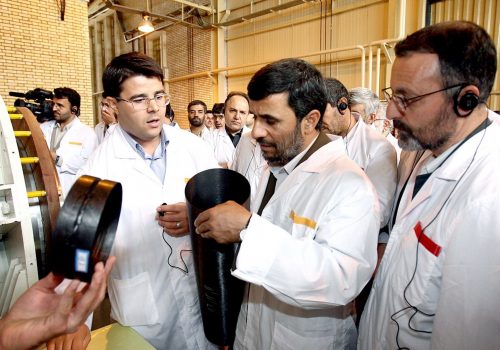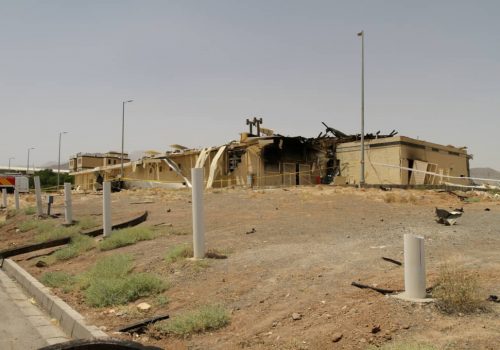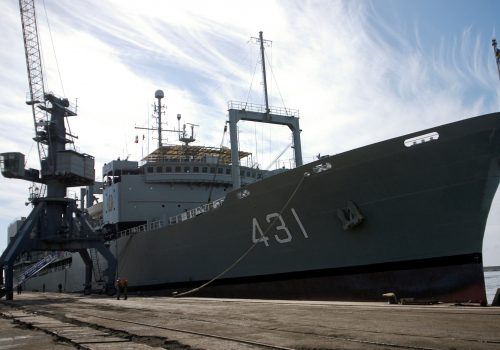An escalating Israel-Iran conflict could sink the JCPOA
Rising tensions between Israel and Iran have reached an alarming stage in recent weeks. What used to be a shadow war of covert operations, sabotage, and proxy conflict is turning into more direct military confrontation between the long-time regional adversaries.
Linking Iran to the July 29deadly drone strike on an Israeli-managed tanker off the coast of Oman, Israeli officials have made explicit threats of direct military action against Iran. Such an escalation could lead to a range of unforeseen outcomes, the worst of which could shift Iran from a largely reactive posture to an offensive one.
In the past few years, Israel has reportedly launched a number of covert attacks against Iran, especially against its nuclear program. The November 2020 assassination of Mohsen Fakhrizadeh, one of Iran’s most prominent nuclear scientists, near Tehran was attributed to Israeli operatives—as were the killings of a half dozen Iranian scientists and technicians a decade ago. Then the Natanz nuclear enrichment facility—hit by a US-Israel cyber attack in 2010—was attacked again in April 2021, which Israeli media has claimed Mossad, the country’s intelligence agency, was responsible for.
A New York Times report, quoting US officials, reveals that Israeli commandos have struck Iranian cargo ships at least ten times since 2019. Iran has responded with its own clandestine attacks on Israeli shipping. In March 2021, the Israeli ship Lori was attacked in the Arabian Sea and Iran was the primary suspect.
Miscalculation by either side could easily lead to a more serious conflict. History is full of incidents in which adversaries stumble into a wider military confrontation after engaging in skirmishes. When an American civilian contractor was killed in rocket attacks blamed on Iran-backed militias in Iraq in late 2019, it set in motion a chain of events that led to the January 2020 US assassination of General Qasem Soleimani, commander of the Quds Force. Iran retaliated by launching ballistic missiles into the al-Assad base in Iraq, injuring more than one hundred American troops.
In the latest incident on July 29, a British and Romanian crew member of the Israeli-managed Mercer Street were killed in an attack that US and European officials believe was conducted by Iran. On August 4, days after the incident, Iran was suspected of potentially hijacking the Emirati-owned Asphalt Princess off the Gulf of Oman.
Beyond the risk of direct escalation, a more overt conflict between Israel and Iran risks jeopardizing the 2015 Iran nuclear deal, which is already hanging by a thread. Iran has significantly reduced its compliance with the deal since the Donald Trump administration withdrew in 2018, and could respond to the latest Israeli attacks by refusing to return to negotiations with the US and deciding to pursue a strategic nuclear capability in the face of an already nuclear-armed Israel. This, in turn, could spark further nuclear proliferation in the Middle East as well as Israeli attacks on Iran’s nuclear facilities, with dreadful consequences for Iranians and others living in their vicinity.
While Israel continues to press major world powers to take collective action against Iran, Tehran might opt for a rare irrational course of action. As the political scientist John Mearsheimer has argued, states initiate war with their opponents when they find the political status quo completely unacceptable, even against those with superior military capabilities.
Iranian officials are understandably frustrated that Tehran did not benefit as much as it had anticipated in economic terms when they were in full compliance with the Joint Comprehensive Plan of Action (JCPOA). So far Iranians have demonstrated self-restrained by not responding to Israeli attacks on their interests in Syria. Such an unfavorable status quo could effectively turn Iran into a revisionist power that pursues radical and possibly irrational foreign policy options.
Iran’s President Ebrahim Raisi has just been inaugurated and, while there are rumors that nuclear talks could resume in October or November, negotiations in Vienna to revive the JCPOA are currently suspended. The US “maximum pressure” campaign initiated by the Trump administration is still in full force and, although Iran and the US have both declared their intention to revive the agreement, initial optimism has faded.
It is unlikely that Israeli politicians will voluntarily cease to fan the flames of tension with Iran as they usually capitalize on fearmongering in their domestic politics. That could make successful nuclear talks harder to achieve.
According to Iran’s ambassador to the International Atomic Energy Agency, Kazem Gharibabadi, one of the unresolved issues between the parties is a US demand that Iran agree to follow-on negotiations over its regional and missile activities in return for the US lifting a terrorism designation on the Islamic Revolutionary Guards Corps.
In the absence of any other prospect for a decrease in US-Iran tensions, it is vital that the nuclear talks resume. Iran should refrain from any activity that could jeopardize the success of the negotiations. Washington, meanwhile, should not only use its influence over Israel to convince it to refrain from provocative actions that could force Iran to respond in kind, but also tone down its rhetoric against Iran. In a recent meeting with Israel’s prime minister, US President Joe Biden voiced his commitment to diplomacy, adding that the US was “ready to turn to other options” if nuclear talks failed. This invoked an immediate response from Ali Shamkhani, the Secretary of Iran’s Supreme National Security Council, who highlighted the country’s “right to reciprocate against available options.” With Afghanistan having fallen to the hands of Taliban and failed states in Yemen, Syria, and Lebanon, as well as a still shaky Iraq, the Middle East cannot afford yet another military conflict.
Sina Azodi is a nonresident fellow at the Atlantic Council and a visiting scholar at the George Washington University’s Institute for Middle East Studies. He is also a PhD Candidate in International Relations at the University of South Florida. Follow him on Twitter @Azodiac83.
Mohsen Solhdoost holds a PhD in International Relations from the University of Queensland. He teaches International Relations courses at the University of Queensland and the Australian Catholic University. Follow him on Twitter: @DrSolhdoost.
Image: The Mercer Street, a Japanese-owned Liberian-flagged tanker managed by Israeli-owned Zodiac Maritime that was attacked off Oman coast as seen in Cape Town, South Africa, December 31, 2015 in this picture obtained from ship tracker website, MarineTraffic.com. Picture taken December 31, 2015. Johan Victor/Handout via REUTERS


